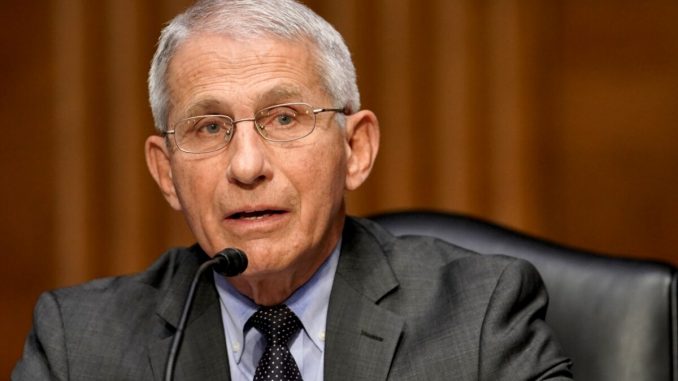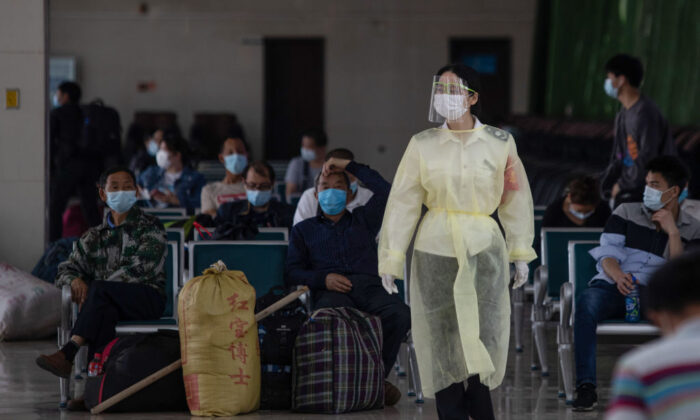
Infectious diseases expert Dr. Anthony Fauci on Tuesday defended the flow of funds from the National Institutes of Health (NIH) to the Wuhan Institute of Virology in China for bat coronavirus research, saying it would have been “almost a dereliction of our duty” for the NIH not to collaborate with Chinese scientists to study how the pathogen might jump from animals to humans.
Fauci made the remarks in testimony before the House Appropriations Subcommittee on Health & Human Services, with the discussion touching on the as-yet-undetermined origin of the CCP (Chinese Communist Party) virus, the pathogen that causes the disease COVID-19.
At issue is around $600,000 of the some $3.7 million in overall NIH funding provided to EcoHealth Alliance that was channeled to the Wuhan Institute of Virology to research coronaviruses in bats in 2014. Fauci defended collaboration with the Wuhan facility, pointing to an earlier coronavirus outbreak with a confirmed bat origin as justification.
“Why do research in collaboration with our Chinese colleagues? Well, the underlying reason for that is that we had a big scare with SARS-CoV-1 back in 2002, 2003, where that particular virus unquestionably went from a bat to an intermediate host to start an epidemic and a pandemic that resulted in 8,000 cases and close to 800 deaths,” Fauci said. “It would’ve been almost a dereliction of our duty if we didn’t study this, and the only way you can study these things is, you’ve gotta go where the action is,” he added.

“I often say, somewhat tongue-in-cheek, you don’t want to study bats in Fairfax County, Virginia, to find out what the animal-human interface is that might lead to a jumping of species,” Fauci continued. “So we had a modest collaboration with very respectable Chinese scientists who were world experts on coronavirus, and we did that through a sub-grant from a larger grant to EcoHealth. The sub-grant was about $600,000 over a period of five years. So it was a modest amount. And the purpose of it was to study the animal-human interface, to do surveillance, and to determine if these bat viruses were even capable of transmitting infection to humans,” he added.
The Wuhan facility, which is home China’s only P4 lab—the highest level of biosafety—has been in the spotlight amid concerns that the CCP virus may have originated there rather than by making a natural jump from bats to humans.
Republican members of the House Intelligence Committee argued in a May 19 report (pdf) that it is more likely the virus escaped from the lab.
“There is overwhelming circumstantial evidence … to support a lab leak as the origination of COVID-19,” stated the report, which was led by Rep. Devin Nunes (R-Calif.), the ranking member on the committee. “By contrast, little circumstantial evidence has emerged to support the PRC’s [People’s Republic of China] claim that COVID-19 was a natural occurrence, having jumped from some other species to humans.”
COVID-19, the disease caused by the CCP virus, first appeared in China’s central city of Wuhan in late 2019, when a cluster of cases was allegedly linked to a local wet market. But more than a year later, the origins of the virus remain unknown.
The Chinese regime has denied that the virus’s origin was linked to the Wuhan lab and has pushed a natural zoonotic hypothesis—that the virus was transmitted to humans from an animal host. However, Beijing has so far failed to identify the original animal species that allegedly passed the virus on to humans.

A report from the World Health Organization (WHO) published in March said that the CCP virus likely spread to people via an unknown animal, but WHO Director-General Tedros Adhanom Ghebreyesus said the mission to study the origins of the virus did not adequately analyze other theories.
“As far as WHO is concerned, all hypotheses remain on the table … We have not yet found the source of the virus,” Ghebreyesus said.
The report’s conclusion was largely based on the WHO’s investigative efforts in January and February this year. Critics noted that the Chinese communist regime had a significant role in their investigation and accused them of engaging in a cover-up.
Earlier this month, Fauci said that he is “not convinced” that the virus developed naturally, and called for a deeper probe into its origins.
On the same day, when asked by a doctor during a Senate hearing about whether it’s possible that the virus arose from a lab accident in Wuhan, Fauci responded, “That possibility certainly exists.”
“I am totally in favor of a full investigation of whether that could have happened,” he said.
It comes as the United States on Tuesday urged the WHO to launch a fresh probe into the source of the CCP virus, highlighting the need for it to be transparent.
“Phase 2 of the COVID origins study must be launched with terms of reference that are transparent, science-based, and give international experts the independence to fully assess the source of the virus and the early days of the outbreak,” said Health and Human Services Secretary Xavier Becerra, in remarks to the 74th World Health Assembly, a virtual event.
More than a dozen nations, including the United States and the European Union, have raised concerns about the phase one WHO study into the origins of the virus, pointing to the report’s significant delay and China’s refusal to share crucial raw data.
Lily Zhou contributed to this report.





Be the first to comment